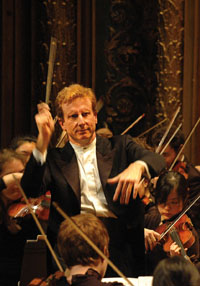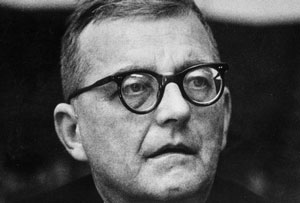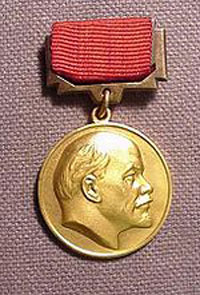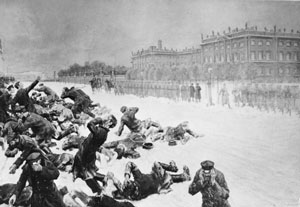NEC at Symphony Hall
Calderwood conductor Hugh Wolff, NEC Philharmonia, Xiang Yu Play Shostakovich, Beethoven, Prokofiev
NEC Philharmonia, Conductor Hugh Wolff Return to Symphony Hall, April 23, 2014 for First Appearance since 2010
Music: Truth to Power Festival Program Includes Music of Beethoven, Prokofiev, and Shostakovich
Rarely Performed Shostakovich Symphony No. 11, Arguably the Composer’s Most Russian Work, is Featured Work
Xiang Yu is Soloist in Prokofiev Violin Concerto No. 1
 New England Conservatory’s year-long festival Music: Truth to Power continues April 23, when the NEC Philharmonia and Hugh Wolff, the Stanford and Norma Jean Calderwood Director of Orchestras, return to Boston’s Symphony Hall for the first time since 2010. Wolff has chosen two works with special revolutionary resonance: the Beethoven “Egmont” Overture and Shostakovich’s infrequently heard Symphony No. 11 (“The Year 1905”), which commemorated the Russian Revolutions of 1905 and 1917. Also on the program is a work with special significance for Symphony Hall, the Violin Concerto No. 1 composed by Sergei Prokofiev in 1917 and given its American premiere in 1925 by the Boston Symphony Orchestra, Concertmaster Richard Burgin, and Music Director Serge Koussevitzky. Violinist Xiang Yu, a candidate for the NEC Artist Diploma, is the soloist.
New England Conservatory’s year-long festival Music: Truth to Power continues April 23, when the NEC Philharmonia and Hugh Wolff, the Stanford and Norma Jean Calderwood Director of Orchestras, return to Boston’s Symphony Hall for the first time since 2010. Wolff has chosen two works with special revolutionary resonance: the Beethoven “Egmont” Overture and Shostakovich’s infrequently heard Symphony No. 11 (“The Year 1905”), which commemorated the Russian Revolutions of 1905 and 1917. Also on the program is a work with special significance for Symphony Hall, the Violin Concerto No. 1 composed by Sergei Prokofiev in 1917 and given its American premiere in 1925 by the Boston Symphony Orchestra, Concertmaster Richard Burgin, and Music Director Serge Koussevitzky. Violinist Xiang Yu, a candidate for the NEC Artist Diploma, is the soloist.
Presented in association with the Celebrity Series of Boston, the performance takes place at 8 pm and is being offered as a Special Bonus to Celebrity Series subscribers. The public is also invited to attend. Tickets are $20/$15; $10 for students, seniors. WGBH members 2-for-1.
Shostakovich Symphony No. 11 ("The Year 1905")  Composed 40 years after the 1917 October Revolution and a half century after the anticipatory 1905 Revolution, Shostakovich’s Symphony No. 11 received its first performance in Moscow in 1957. It came in the wake of Stalin’s death in 1953 but at a time when the composer, who might be expected to feel a sense of liberation from the artistic repression of the Stalinist regime, was feeling depressed and deflated. As Gerard McBurney of the Chicago Symphony Orchestra has written, Shostakovich, with a few notable exceptions like the Tenth Symphony, spent much time cranking out “tub-thumping film music, music for unpretentious practical use, and ‘official’ music of one kind or another, including popular songs to sentimental words of the ‘Communist Youth’ variety.” Not surprisingly, his reputation among serious musicians was in decline, and he was viewed “as an unadventurous conservative, a hack, an official Soviet bard. In the West, his music was written off by commentators as more or less irrelevant as the avant-garde discovered brave new worlds of sound and post-war popular music began to overwhelm the classical traditions.”
Composed 40 years after the 1917 October Revolution and a half century after the anticipatory 1905 Revolution, Shostakovich’s Symphony No. 11 received its first performance in Moscow in 1957. It came in the wake of Stalin’s death in 1953 but at a time when the composer, who might be expected to feel a sense of liberation from the artistic repression of the Stalinist regime, was feeling depressed and deflated. As Gerard McBurney of the Chicago Symphony Orchestra has written, Shostakovich, with a few notable exceptions like the Tenth Symphony, spent much time cranking out “tub-thumping film music, music for unpretentious practical use, and ‘official’ music of one kind or another, including popular songs to sentimental words of the ‘Communist Youth’ variety.” Not surprisingly, his reputation among serious musicians was in decline, and he was viewed “as an unadventurous conservative, a hack, an official Soviet bard. In the West, his music was written off by commentators as more or less irrelevant as the avant-garde discovered brave new worlds of sound and post-war popular music began to overwhelm the classical traditions.”
When the Eleventh debuted, it was met with widely mixed reactions. There was disappointment among those who heard socialist realist banality, dawning understanding from more subtle listeners, and high praise from musical officialdom—so much high praise, in fact, that Shostakovich was awarded the Lenin Prize for 1958 and was completely rehabilitated from his previous disfavor. Among the issues cited by all sides was the symphony’s extensive quotation of familiar revolutionary songs and reminiscences of classic Russian scores such as Musssorgsky’s Boris Godunov. Shostakovich himself reportedly said that his work orchestrating Mussorgsky “contributed greatly to my Seventh and Eighth Symphony and then was recalled in the Eleventh and there was a time when I considered the Eleventh my most Mussorgskian composition.”  In praise of the song quotations, a Union of Soviet Composers critic commented that “Thanks to extensive use of the revolutionary song heritage, the language of the symphony proved to be simpler and more accessible than in previous works of the composer while remaining at the same time deeply individual.”
In praise of the song quotations, a Union of Soviet Composers critic commented that “Thanks to extensive use of the revolutionary song heritage, the language of the symphony proved to be simpler and more accessible than in previous works of the composer while remaining at the same time deeply individual.”
On the other hand Aleksandr Solzhenitsyn writing in The Gulag Archipelago “failed to discern any redeeming contemporary message behind the Eleventh Symphony,” according to Shostakovich biographer Laurel Fay.
Yet the great poet Anna Akhmatova, who heard the premiere, was deeply moved by the symphony and the Russian songs it contained. She likened those songs to “white birds flying against a terrible black sky.” And she told a friend, “His revolutionary songs sometimes spring up close by, sometimes float by far away in the sky . . . they flare up like lightning . . . That’s the way it was in 1905. I remember.” Then, there is the question of whether the symphony has a subtext like certain other Shostakovich works. Richard Taruskin and Solomon Volkov opine that ‘the violent music in the second movement is associated not with events of Bloody Sunday 1905 (in photo right) but with the more contemporaneous events in Hungary (1956) where Soviet troops had put down a rebellion.” And as the musicologist Lev Lebedinsky put it, "What we heard in this music was not the police firing on the crowd in front of the Winter Palace in 1905, but the Soviet tanks roaring through the streets of Budapest. This was so clear ‘to those who had ears to listen,’ that [Shostakovich's] son, with whom he wasn't in the habit of sharing his deepest thoughts, whispered during the dress rehearsal, ‘Papa, what if they hang you for this?’”
Then, there is the question of whether the symphony has a subtext like certain other Shostakovich works. Richard Taruskin and Solomon Volkov opine that ‘the violent music in the second movement is associated not with events of Bloody Sunday 1905 (in photo right) but with the more contemporaneous events in Hungary (1956) where Soviet troops had put down a rebellion.” And as the musicologist Lev Lebedinsky put it, "What we heard in this music was not the police firing on the crowd in front of the Winter Palace in 1905, but the Soviet tanks roaring through the streets of Budapest. This was so clear ‘to those who had ears to listen,’ that [Shostakovich's] son, with whom he wasn't in the habit of sharing his deepest thoughts, whispered during the dress rehearsal, ‘Papa, what if they hang you for this?’”
Fay, less inclined to be so prescriptive, allows that “the evils of tyranny and oppression with which the symphony deals are a pervasive theme in Shostakovich’s music, one he well knew is timeless and universal.”
So what is the Symphony No. 11? Shostakovich’s most Russian/ Mussorgskian work? A piece of cinematic agit-prop? A commentary on the crushed Hungarian uprising? A deeply reflective “Requiem for a Generation,” as Shostakovich claimed, according to Volkov's controversial memoir? The work of a washed-up genius who, after 20 years of suppression, has succumbed to the political juggernaut? A beautifully organized work that speaks tragically to the inevitable recurrence of despotism?
Hugh Wolff, who has a special affinity for the Shostakovich Symphonies and who led the Shostakovich Tenth at the last Symphony Hall concert, feels a strong commitment to the Eleventh. So listeners will have an opportunity to decide for themselves after the Philharmonia performance, April 23.
For more information and to order tickets, click here.
ABOUT NEW ENGLAND CONSERVATORY
A cultural icon approaching its 150th anniversary in 2017, New England Conservatory (NEC) is recognized worldwide as a leader among music schools. Located in Boston, Massachusetts, on the Avenue of the Arts in the Fenway Cultural District, NEC offers rigorous training in an intimate, nurturing community to undergraduate, graduate, and post-graduate music students from around the world. Its faculty of 225 boasts internationally esteemed artist-teachers and scholars. NEC alumni go on to fill orchestra chairs, concert hall stages, jazz clubs, recording studios, and arts management positions worldwide. Half of the Boston Symphony Orchestra is composed of NEC-trained musicians and faculty.
NEC is the oldest independent school of music in the United States. Founded in 1867 by Eben Tourjee, an American music educator, choral conductor and organist, its curriculum is remarkable for its wide range of styles and traditions. On the college level, NEC features training in classical, jazz, and Contemporary Improvisation. Graduate and post-graduate programs supplement these core disciplines with orchestral conducting and professional chamber music training. Additional programs, such as the Sistema Fellows, a professional training program for top postgraduate musicians and music educators that creates careers connected to music, youth, and social change, and Entrepreneurial Musicianship, a cutting-edge program integrating professional and personal skills development into the musical training of students to better develop the skills and knowledge needed to create one’s own musical opportunities, also enhance the NEC experience.
Through its Preparatory School, School of Continuing Education, and Community Programs and Partnerships Program, the Conservatory provides training and performance opportunities for children, pre-college students, and adults. Through its outreach projects, it allows young musicians to engage with non-traditional audiences in schools, hospitals, and nursing homes—thereby bringing pleasure to new listeners and enlarging the universe for classical music, jazz, and Contemporary Improvisation. Currently more than 750 young artists from 46 states and 39 foreign countries attend NEC on the college level; 1,400 young students attend on the Preparatory level; and 325 adults participate in the Continuing Education program.
The only conservatory in the United States designated a National Historic Landmark, NEC presents more than 900 free concerts each year. Many of these take place in Jordan Hall (which shares National Historic Landmark status with the school), world-renowned for its superb acoustics and beautifully restored interior. In addition to Jordan Hall, more than a dozen performance spaces of various sizes and configurations are utilized to meet the requirements of the unique range of music performed at NEC, from solo recitals to chamber music to orchestral programs to big band jazz, Contemporary Improvisation, and opera scenes. Every year, NEC’s opera studies department also presents two fully staged opera productions at the Cutler Majestic Theatre or Paramount Center in Boston, and a semi-staged performance in Jordan Hall. This past 2012-2013 season, the operas produced were Gluck’s Orfeo ed Euridice, Britten’s The Turn of the Screw, and Rossini’s La Gazzetta.
NEC is co-founder and educational partner of From the Top, a weekly radio program that celebrates outstanding young classical musicians from the entire country. With its broadcast home in Jordan Hall, the show is now carried by National Public Radio and is heard on 250 stations throughout the United States.
Contact: Ellen Pfeifer
Senior Communications Specialist
New England Conservatory
290 Huntington Ave.
Boston, MA 02115
617-585-1143
Ellen.pfeifer@necmusic.edu
